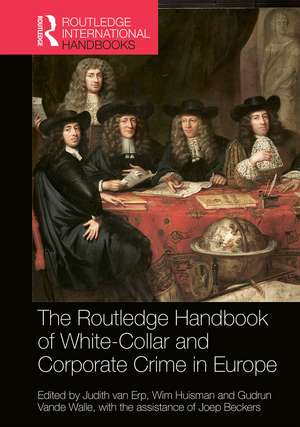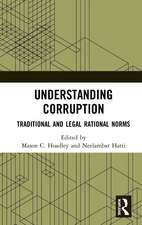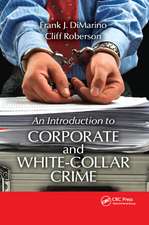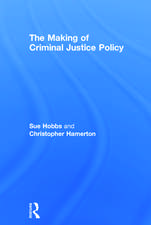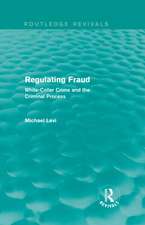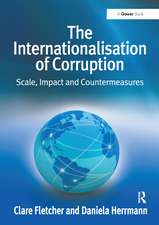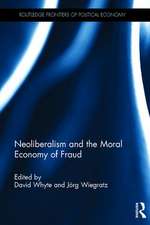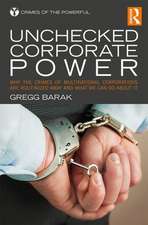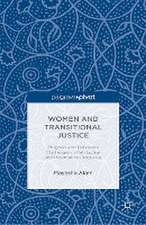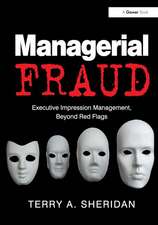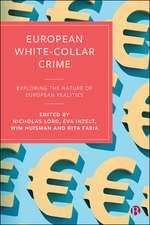The Routledge Handbook of White-Collar and Corporate Crime in Europe
Editat de Judith van Erp, Wim Huisman, Gudrun Vande Walleen Limba Engleză Hardback – 27 apr 2015
Adding to the existing Anglo-American body of knowledge, the Handbook will discuss specific European topics and typical European features of white-collar crime. The Routledge Handbook of White-Collar and Corporate Crime in Europe consists of more than thirty chapters on topics ranging from the Icelandic Banking Crisis, to the origins of the study of white collar crime, to contemporary topics, such as white-collar crime in countries post-transition from communist regimes; the illegal e-waste trade and white-collar crime in professional football. Furthermore, the book contains extensive case study analyses of landmark European cases of white-collar crime.
The editors have gathered together the leading voices in the field and a final section offers commentaries on white-collar crime in Europe from eminent criminologists David Friedrichs and Hazel Croall. This Handbook will thus serve as a work of reference for all scholars and students engaged in the study of corporate and white-collar crime and will also set out directions for new research in the future.
| Toate formatele și edițiile | Preț | Express |
|---|---|---|
| Paperback (1) | 341.55 lei 3-5 săpt. | +22.67 lei 7-13 zile |
| Taylor & Francis – 30 iun 2020 | 341.55 lei 3-5 săpt. | +22.67 lei 7-13 zile |
| Hardback (1) | 1484.28 lei 3-5 săpt. | +23.17 lei 7-13 zile |
| Taylor & Francis – 27 apr 2015 | 1484.28 lei 3-5 săpt. | +23.17 lei 7-13 zile |
Preț: 1484.28 lei
Preț vechi: 1631.08 lei
-9% Nou
Puncte Express: 2226
Preț estimativ în valută:
284.02€ • 297.14$ • 235.93£
284.02€ • 297.14$ • 235.93£
Carte disponibilă
Livrare economică 12-26 martie
Livrare express 26 februarie-04 martie pentru 33.16 lei
Preluare comenzi: 021 569.72.76
Specificații
ISBN-13: 9780415722148
ISBN-10: 0415722144
Pagini: 580
Ilustrații: 30 black & white illustrations, 32 black & white tables, 30 black & white line drawings
Dimensiuni: 174 x 246 x 43 mm
Greutate: 0.53 kg
Ediția:1
Editura: Taylor & Francis
Colecția Routledge
Locul publicării:Oxford, United Kingdom
ISBN-10: 0415722144
Pagini: 580
Ilustrații: 30 black & white illustrations, 32 black & white tables, 30 black & white line drawings
Dimensiuni: 174 x 246 x 43 mm
Greutate: 0.53 kg
Ediția:1
Editura: Taylor & Francis
Colecția Routledge
Locul publicării:Oxford, United Kingdom
Public țintă
Postgraduate and UndergraduateCuprins
1. An introduction to white-collar and corporate crime in Europe, W. Huisman, , J. van Erp, G. Vande Walle and J. Beckers Part I Defining and measuring white-collar and corporate crime in Europe 2. The measurement of corporate crime: an exercise in futility?, C. Walburg 3. Determining the adequate enforcement of white-collar and corporate crimes in Europe, N. Lord and M. Levi 4. Charting Europe’s moral economies: Citizens, consumers, and the crimes of everyday life, S. Karstedt 5. On the Difficulty of Measuring Economic Crime, L. Korsell 6. Measuring white-collar crime perceptions among public and white collar offenders: A comparative investigation of four European countries, T. Alalehto and D. Larsson Part II Historical perspectives on white-collar and corporate crime in Europe 7. Willem Bonger: the unrecognized European pioneer of the study of white collar crime, P. Hebberecht 8. Corporate involvement in the Holocaust and other Nazi crimes, A. Van Baar 9. Special criminal law and inspectorates in Europe, P. Ponsaers Part III Contemporary white-collar and corporate crime in Europe White-collar crime in countries of transition 10. Economic Crime and the Privatisation of East German Corporations, K. Boers, H. Theile, B. Bischoff, K. Karliczek 11. White Collar Crime in Countries of Transition. The Lesson of Hungary, E. Inzelt 12. Retroactive prosecution of transitional economic crimes in Croatia. Testing the legal principles and human rights, P. Novoselec, S. Roksandić Vidlička and A. Maršavelski Deviance in academia 13. Within our walls: white collar crime in Greek academia, S. Georgoulas and A. Voulvouli EU fraud 14. EU fraud and new member states - a success story? The case of Bulgaria, B. Quirke Environmental crime and transnational waste flows 15. Facilitators of Environmental Crime. Corporations and Governments in the Port of Antwerp, L. Bisschop 16. The limits of environmental regulation in a globalized economy. Lessons from the Probo Koala case, K. Van Wingerde Landmark cases of white-collar crime in Europe 17. The Icelandic approach to the 2008 banking crisis, S. Will 18. Professional football and crime. Exploring terra incognita in studies on white collar crime, H. Nelen 19. ‘We are all going to be rich’. A case study of the Dutch Real estate fraud case, H. Van de Bunt and K. Van Wingerde 20. Varieties of corruption in the shadow of Siemens. A modus-operandi study of corporate crime on the supply side of corrupt transactions, J. Klinkhammer 21. Shadows of power. Agusta, a Belgian affair, M. Cools and V. Pashley 22. The Italian Eternit Case, R. Altopiedi Part IV Responses to white-collar crime in Europe Criminalization and regulation 23. Political Culture and Corporate Homicide Liability in the UK and Europe, P. Almond 24. Management of tax transgressions in France: a Foucauldian perspective, A. Amicelle 25. The prosecution of white-collar crime in a developing economy: A case study of Ireland in the 20th century, J McGrath Corporate selfregulation 26. Whistleblowing in Europe? Regulatory frameworks and empirical research, R. Kölbel 27. How personality and company culture impact on company anti-corruption programs, K. Bussmann Law enforcement 28. The Comparative Political Economy of Financial Crimes and Their Enforcement: The Case of Insider Trading, C. Györy 29. Global governance = global compliance? The uneven playing field in anti-money laundering, A. Verhage 30. The perception of Seveso regulation and inspection in chemical corporations, M. Kluin 31. How does law enforcement respond to entrepreneurial white-collar crime? Some insights from Portugal, J. Cruz, R. Faria, A. Lamas Leite and P. Sousa Part V Anglo-American reflections on white-collar crime in Europe 32. White-collar crime in Europe: afterword, H. Croall 33. White-collar crime in Europe: American reflections, D. Friedrichs.
Notă biografică
Judith van Erp is Professor of Public Institutions at Utrecht University, the Netherlands. Her research addresses corporate compliance and corporate crime. She has published on various public and private modes of regulation and governance of corporate behavior and their intersection, and in particular, on the role of the media and ‘naming and shaming’ in governing corporate crime. Together with Gudrun Vande Walle and Wim Huisman, she founded and co-chairs the European Working Group on Organizational Crime, a subdivision of the European Society of Criminology. She also co-chairs the Collaborative Research Network on Regulatory Governance of the Law and Society Association.
Wim Huisman specializes in prevalence and causes of corporate and white-collar crime. Recently, he published on corporate crime and economic crisis, corporate involvement in gross human rights violations, environmental crime, food fraud and corporate crime theory. He teaches a course on White-collar Crime in the master’s programme in Criminology at VU School of Criminology and is the co-chair of the European Society of Criminology’s Working Group on Organizational Crime, as well as editor of the Netherlands Journal of Criminology.
Gudrun Vande Walle has worked on integrity and anti-corruption policy and on victimization and conflict resolution in relation to corporate crime. She recently exchanged academic research for the practice of investigation and prosecution of Economic and Financial crime for the Belgian public prosecutor. Gudrun teaches a course on Governance and Ethics in the Master Public Administration and Public Management at Ghent University and is member of the research unit "Government and Law" at University of Antwerp. She is co-chair of the European Society of Criminology’s Working Group on Organizational Crime.
Wim Huisman specializes in prevalence and causes of corporate and white-collar crime. Recently, he published on corporate crime and economic crisis, corporate involvement in gross human rights violations, environmental crime, food fraud and corporate crime theory. He teaches a course on White-collar Crime in the master’s programme in Criminology at VU School of Criminology and is the co-chair of the European Society of Criminology’s Working Group on Organizational Crime, as well as editor of the Netherlands Journal of Criminology.
Gudrun Vande Walle has worked on integrity and anti-corruption policy and on victimization and conflict resolution in relation to corporate crime. She recently exchanged academic research for the practice of investigation and prosecution of Economic and Financial crime for the Belgian public prosecutor. Gudrun teaches a course on Governance and Ethics in the Master Public Administration and Public Management at Ghent University and is member of the research unit "Government and Law" at University of Antwerp. She is co-chair of the European Society of Criminology’s Working Group on Organizational Crime.
Recenzii
‘This superb handbook brings together leading European scholars of white-collar and corporate crime. In light of the increasing globalization of manufacturing, markets, finance, and governance, its expansive coverage of landmark cases throughout Europe and European responses to them could not have appeared at a more opportune time. The editors and contributors are to be commended for enlarging our vision of white-collar and corporate crime as a problem of worldwide significance.’ - Michael L. Benson, Professor, School of Criminal Justice, University of Cincinnati, USA
‘The concept of white-collar crime originated in the United States, and much of the subsequent research in the field has been conducted in English-speaking nations. So it is indeed exciting to see this welcome collection of European scholarship. With its rich case studies, and its interpretive essays on generic crime types, this book is indispensable reading for scholars of white-collar and corporate crime across the globe.’ - Peter Grabosky, Professor Emeritus, RegNet, Australian National University, Australia
‘This well-crafted volume breaks new intellectual ground with its European-focused scholarship on white-collar and corporate crime. An excellent resource to stimulate new thinking and research topics for a new generation of scholars.’ - Sally Simpson, Professor of Criminology and Criminal Justice and Director, Center for the Study of Business Ethics, Regulation, and Crime, University of Maryland, USA
‘This book is a stellar contribution to the evolving global understanding of white-collar and corporate crime. As the editors note in the introduction, the field has been dominated by American, Australian and British scholars for an array of reasons and with resulting limited applications and relevance to different economies and political systems. The Handbook of W
‘The concept of white-collar crime originated in the United States, and much of the subsequent research in the field has been conducted in English-speaking nations. So it is indeed exciting to see this welcome collection of European scholarship. With its rich case studies, and its interpretive essays on generic crime types, this book is indispensable reading for scholars of white-collar and corporate crime across the globe.’ - Peter Grabosky, Professor Emeritus, RegNet, Australian National University, Australia
‘This well-crafted volume breaks new intellectual ground with its European-focused scholarship on white-collar and corporate crime. An excellent resource to stimulate new thinking and research topics for a new generation of scholars.’ - Sally Simpson, Professor of Criminology and Criminal Justice and Director, Center for the Study of Business Ethics, Regulation, and Crime, University of Maryland, USA
‘This book is a stellar contribution to the evolving global understanding of white-collar and corporate crime. As the editors note in the introduction, the field has been dominated by American, Australian and British scholars for an array of reasons and with resulting limited applications and relevance to different economies and political systems. The Handbook of W
Descriere
This book presents a comprehensive account of European white-collar crime, focusing on its history, methods of measuring its extent, its regulation, governance and enforcement, as well as its specific European character.
The editors have gathered together the leading voices in the field and specific case studies are discussed at length. A final section offers commentaries on European white-collar crime from two eminent criminologists.
The editors have gathered together the leading voices in the field and specific case studies are discussed at length. A final section offers commentaries on European white-collar crime from two eminent criminologists.
